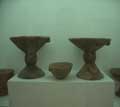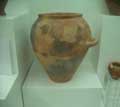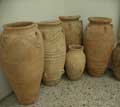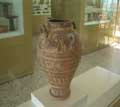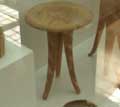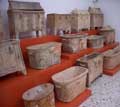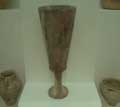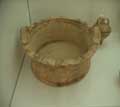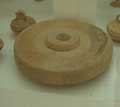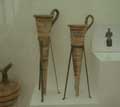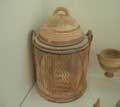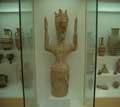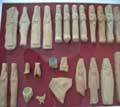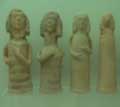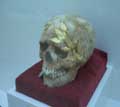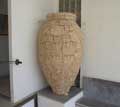
(tel. 28410 24943)
The Archaeological Museum of Agios Nikolaos was created with the purpose of exhibiting findings from eastern Crete that until then were transferred to the Heraklion Museum. The exhibition does not have its definitive form, but covers a huge period of time from the Neolithic Age to the end of the Greco-Roman period. The visitor can follow the timeless evolution of art in the area through representative samples of various rhythms and eras. Larger and more important collections are the offerings from the Proto-Minoan cemetery of Agia Fotia near Sitia (3,000-2,300 BC) in the first room and the findings from the palace of Mallia brought to light by the researches of the French Archaeological School, in the fourth room.
The Museum building is rectangular with eight exhibition rooms arranged in a circle around a central rectangle and paved atrium. In the first room, offerings found in 1971 in the seaside cemetery of Agia Fotia are exhibited. This cemetery, the largest in number of tombs in prehistoric Crete and one of the largest in Greece, had at least 260 tombs with over 1,600 vessels, some bronze manuals and many obsidian blades (3,000-2,300 BC).
In the second room, another famous younger group of pottery from the important Proto-Minoan settlement of Fournos Korifi near the village of Myrtos Ierapetras is exhibited. The most famous object of the Museum "the goddess of Myrtle" belongs to her. This is an excellent spinal vessel (BC IIb period) in the form of a stylized goddess with a very small head on a tall, slender neck and a bell-shaped body.
In the past, periodic exhibitions have been hosted such as: "Lasithi 5,000 years of artistic expression: Nikos Sotiriadis, 1997 A.D. mask-figures", "European Cultural Heritage Days: The Immortal Water" etc. In the near future the halls will receive their final form, as it is intended to re-exhibit the objects in the context of the inclusion of the Museum in the 3rd CSF by the KD Ephorate of Prehistoric and Classical Antiquities, to which it belongs.
Editor: Niki Kalopaidis










